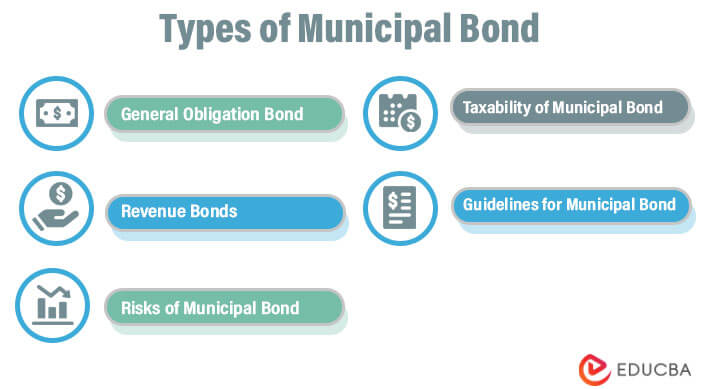Updated July 17, 2023
Definition of Municipal Bond
The government municipality or state issues municipal bonds. These bonds are tax-free and are used to finance government projects for the welfare of society.
These bonds are raised when the government of the state needs money. The government offers these bonds to the public and raises money. The taxpayers can also get benefit from the investment in these bonds. These treat as an investor’s loan to purchase municipal bonds.
Explanation
Municipal bonds are bonds the government issues to finance government projects, i.e., building roads, constructing bridges, repairing and maintaining public properties, etc. These bonds are also known as debt securities which are treated as a loan for any investor. These bonds can quickly sell out to other prospective investors at their convenience. Whenever any investor purchases this bond, it is assumed that the investor is lending money to the government; in this case, the government will be known as the issuer. In return, the government will promise to pay the investor a certain amount of interest and repay the bond’s book value as well. These bonds are also gaining popularity because they are tax-free in the investors’ hands.
Characteristics of Municipal Bonds
- These bonds are debt securities, meaning they are a kind of debt that the investors give to the government.
- Investors are not required to pay if these bonds are tax-free.
- The government issues these bonds to finance government projects used for the public.
- After maturing, the government will repay the principal and this bond’s interest value.
How Does Municipal Bond Work?
Municipal bonds are issued when money requires for government projects. Whenever these bonds are given to the public, the investor purchases the bonds, and then the debt creates. The government must pay back the principal and interest on these bonds. Usually, the claim is paid within 6 months before the due date comes. The face value and the entire outstanding interest amount are paid on the due date. This is how the municipal bond works.
Example:
These bonds use to finance government projects, i.e., the construction of new roads, repairing old roads, building bridges, etc.
Types of Municipal Bond
- General Obligation Bond: Generally, the government issues obligation bonds which are usually risky and can provide much higher returns than other municipal bonds.
- Revenue Bonds: Government entities also issue revenue bonds, which are secured and less risky.
- Risks of Municipal Bond: These bonds’ risk factors can vary. Certain municipal bonds are secured and are less risky, whereas certain municipal bonds are less secured and are very much risky. The uncertainty of repayment is always there, and therefore it cannot be said that municipal bonds are not risky at all.
- Taxability of Municipal Bond: The interest on these bonds is tax-free in India. Therefore these bonds are very popular among investors.
- Guidelines for Municipal Bond: Municipalities have recently gained popularity in India. Municipal bonds are a secure and less risky option for any investor to invest in it. Nowadays government has relaxed the provisions of municipal bonds, and thus, it becomes easy for investors to invest their proceeds in municipal bonds.
Advantages
- These bonds are tax-free, and therefore, they are popular among investors.
- These bonds also help the government raise funds for the development of the public as a whole.
- Investment in bonds is also very secure in comparison to other investment options.
- Municipal bonds offer some very flexible options for investors. Therefore, they can easily plan their financials accordingly.
- These bonds are also strategically made for investment.
- These bonds are safe and secure, and less risky.
- These bonds pay taxes every six months; therefore, tax planning can be done very easily.
- The investment in municipal bonds is also for the long term; therefore, the investor can easily plan for their investments.
Disadvantages
- These bonds pay less interest to the investors, and therefore some classes of investors will not get any interest in investing in municipal bonds.
- Sometimes in the case of municipal bonds, the returns are not guaranteed. Thus the investor may lose faith and interest in that bond.
- These bonds are less risky and more secure, but sometimes these bonds cannot be secured and may negatively impact the investors’ returns.
- Another challenge that is very common with these bonds is that the issuer, i.e., the government entity is so small that they cannot repay the amount taken as a loan in the name of these bonds from the investors.
Conclusion
Municipal bonds are secured and less risky than any other securities. These bonds are becoming very popular nowadays, and therefore, investors are investing in these types of bonds. The local authorities issue these bonds, which are also tax-free in the hands of the investors. These bonds pay less interest to the investors; thus, some investors are not interested in investing in such bonds. These bonds also provide a long-term investment plan; the interest is due every 6 months. Therefore, the investor can do all the necessary planning for their portfolio.
Recommended Articles
This is a guide to Municipal Bond. We discuss municipal bonds’ definition, characteristics, advantages, and disadvantages here. You may also have a look at the following articles to learn more –





